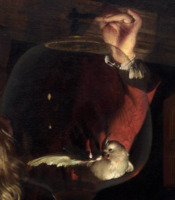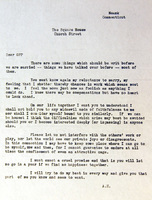Items
Site
The Medicine Chest
keywords is exactly
insular
-

The Hunting of the Snark
"The Hunting of the Snark offers a timely caution for geographical investigation. The danger, both academic and pragmatic, of enslavement to static conceptual categories, rigid classifications, and established methodological procedures is simply that they tend to rule out the possibility of experiencing that insight and understanding which can be neither discovered, formulated nor communicated by adherence to traditional investigative methdologies. This is not to advocate an un-methodical and irrational geographical philosophy, but rather to suggest that there may be conditions under which slavish adherence to a tried and tested methodology may fail to provide reliable guidance in our search for understanding. A lack of commitment to open-ended investigation could mean that, because our methods are inappropriate, our explorations will forever remain, so to speak, 'snarked' ". -

Ocean Chart
"He had bought a large map representing the sea, Without the least vestige of land: And the crew were much pleased when they found it to be A map they could all understand". -

Condensation Cube
"One of Hans Haacke’s earlier works. While over time the artist developed a critique of art as an institution and system, these early works focus on art in the sense of process and physical system. Interested in biology, ecology and cybernetics, in the mid-sixties Haacke was influenced by the ideas of Ludwig von Bertalanffy, especially those outlined in his General System Theory of 1968. For the Austrian biologist and philosopher, a living organism is an open system that continuously changes depending on its dialogue or interaction with the environment. Haacke’s early works, such as Condensation Cube, transpose this concept to the realm of art" (MACBA 2021). -

Modest_ Witness@Second _Millenium
Boyle's 'New Experiments Physico-Mechanical Touching the Spring of the Air', which describes experiments with an air-pump, recounts a demonstration attended by high-born women at which small birds were suffocated by the evacuation of the chamber in which the animals were held. Since the ladies interrupted the experiments by demanding that air be let in to rescue a struggling bird, Boyle reported that “to avoid such difficulties, the men later assembled at night to conduct the procedure and attest to the results” (Haraway 2004: 232). -

Amelia's letter
Amelia Earhart sat down on the morning of February 7th, 1931, and penned this letter to her publicist and future husband, George Putnam: "Please let us not interfere with the others’ work or play, nor let the world see our private joys or disagreements. In this connection I may have to keep some place where I can go to be myself, now and then, for I cannot guarantee to endure at all times the confinements of even an attractive cage". -

"I've decided to stop pitying myself"
“Her purse is half open, and I see a hotel room key, a metro ticket, and a hundred-franc note folded in four, like objects brought back by a space probe sent to earth to study how earthlings live, travel, and trade with one another. The sight leaves me pensive and confused. Does the cosmos contain keys for opening up my diving bell? A subway line with no terminus? A currency strong enough to buy my freedom back? We must keep looking. I'll be off now". An extract from Jean-Dominique Bauby's 'The Diving Bell and the Butterfly', the memoir which he dictated after suffering a stroke in 1995. The stroke rendered him mute and almost completely paralyzed, except for the movement of his left eyelid. Bauby dictated his memoir through blinking as his speech therapist listed the letters of the alphabet. When his doctor told him his prognosis, he mentioned that in the past , he would have simply died from this type of stroke, but that improved resuscitation techniques had now prolonged and refined the agony of this condition: "You survive, but you survive with what is so aptly known as 'locked-in syndrome'”.


